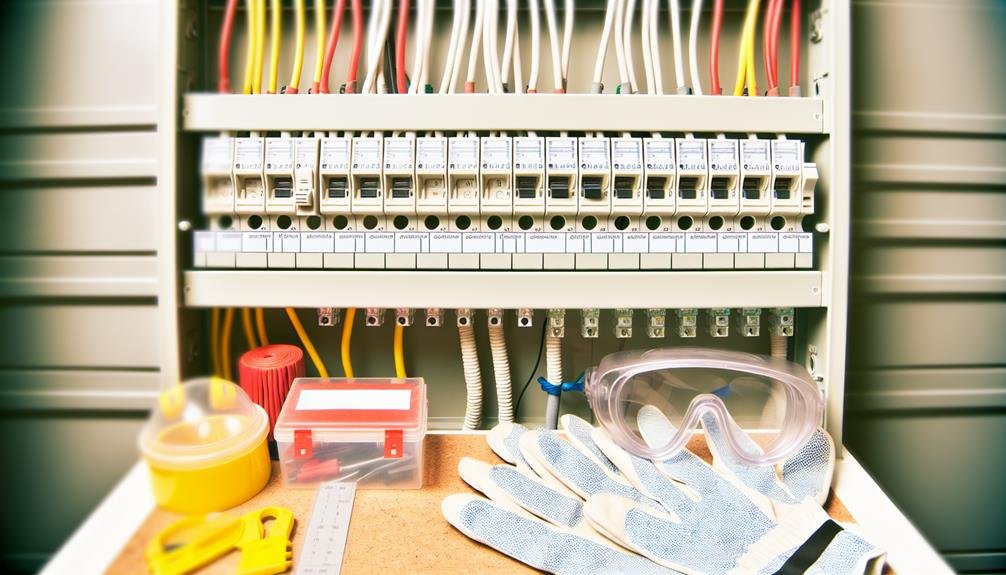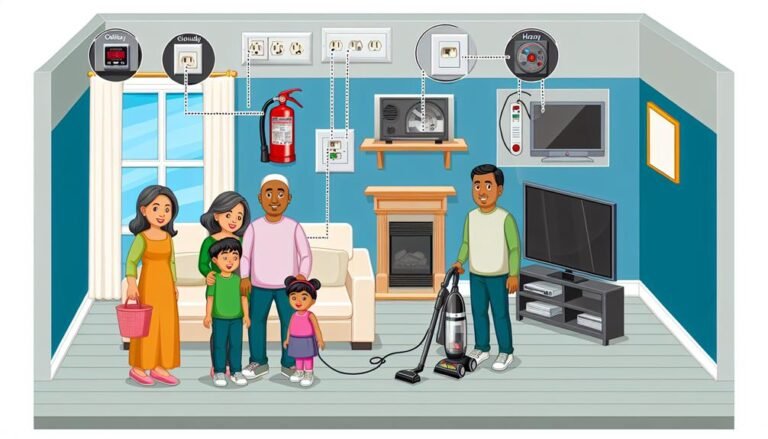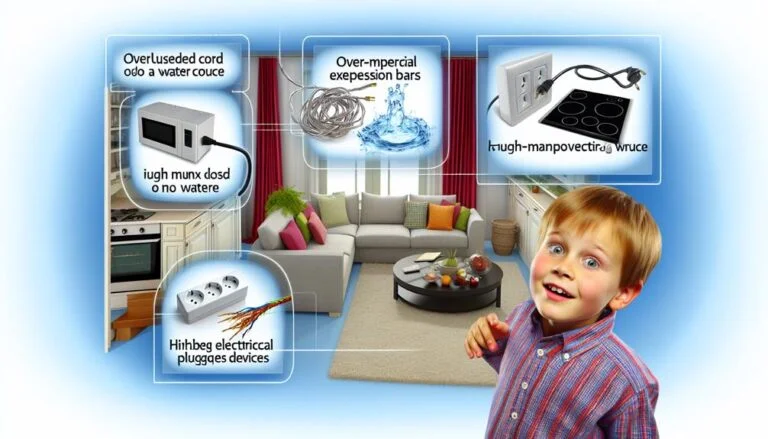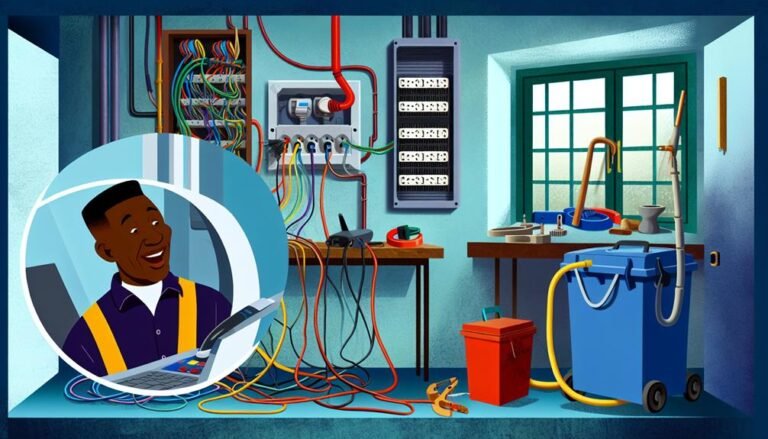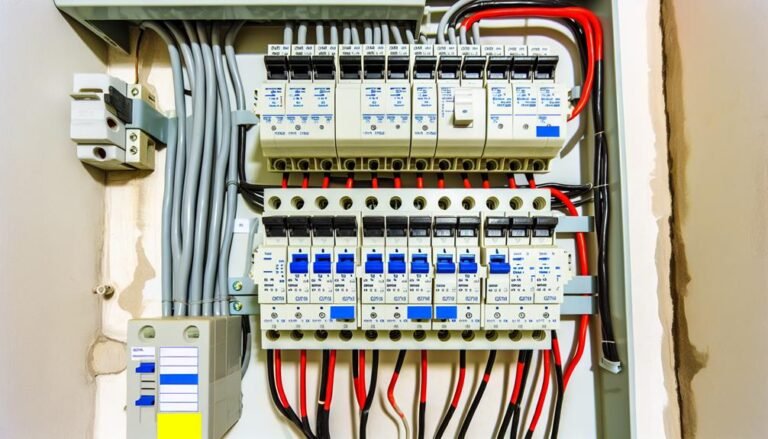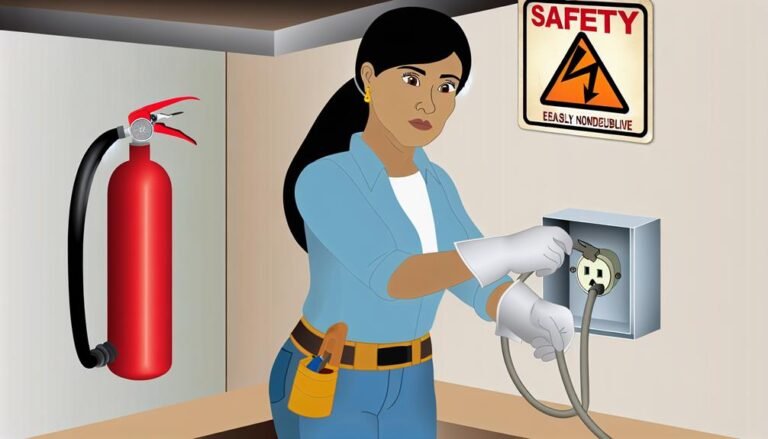Best Practices for Ensuring Electrical Safety
Are you looking to ensure the safety of your electrical systems? Look no further, as we present to you the 7 best practices that will help you achieve just that.
Regular electrical maintenance, hiring professional electricians, and having the right safety equipment are just a few of the crucial steps you can take.
But that’s not all. We will also discuss the importance of grounding and insulation, proper handling and storage of electrical components, and how to ensure electrical safety in both residential and commercial settings.
So, if you want to keep your electrical systems safe and secure, keep reading to discover these essential best practices.
Key Takeaways
- Regular electrical maintenance is essential for safety and efficiency.
- Neglecting electrical safety can lead to shocks, fires, and fatalities.
- Hiring a professional electrician reduces the risk of accidents and ensures compliance with safety standards.
- Proper handling techniques and the use of personal protective equipment are crucial for electrical safety.
Importance of Regular Electrical Maintenance
Regular electrical maintenance is essential to ensure the safety and efficiency of your electrical system. By conducting regular electrical inspections and performing common electrical maintenance tasks, you can prevent potential hazards, reduce energy consumption, and extend the lifespan of your electrical equipment.
One of the main reasons why regular electrical inspections are important is to identify any potential electrical issues before they escalate into major problems. Electrical inspections involve a thorough examination of your electrical system, including wiring, outlets, switches, and appliances. This helps to detect any faulty or outdated components that may pose a safety risk, such as frayed wires or overloaded circuits. By addressing these issues promptly, you can prevent electrical fires, electrical shocks, and other accidents.
In addition to inspections, there are several common electrical maintenance tasks that should be performed regularly. These include cleaning electrical panels, tightening connections, replacing worn-out components, and testing safety devices such as circuit breakers and ground fault circuit interrupters (GFCIs). By maintaining these components, you can ensure that they function properly and provide the necessary protection for your electrical system.
Regular electrical maintenance not only enhances safety but also improves the efficiency of your electrical system. By keeping your electrical equipment in good condition, you can reduce energy waste and lower your electricity bills. Moreover, a well-maintained electrical system operates more reliably and has a longer lifespan, saving you money on costly repairs and replacements.
Risks and Hazards of Neglecting Electrical Safety
Neglecting electrical safety poses significant dangers that can lead to potential electrical accidents. Ignoring safety protocols increases the risk of electrical shocks, fires, and even fatalities.
The consequences of neglecting electrical safety can be severe, resulting in property damage, injuries, and loss of life. It’s crucial to prioritize electrical safety to prevent these risks and hazards.
Dangers of Electrical Neglect
Electrical safety must never be overlooked as it poses significant risks and hazards when neglected. To fully understand the dangers of electrical neglect, consider the following points:
- Dangers of Electrical Fires
Failure to adhere to electrical safety guidelines can result in electrical fires, which can be devastating and life-threatening. Neglecting routine maintenance, such as checking for faulty wiring or overloaded circuits, increases the risk of electrical fires.
- Importance of Electrical Safety Training
Proper training on electrical safety is crucial to minimize the risks associated with electrical neglect. Lack of knowledge and awareness can lead to mishandling of electrical equipment, increasing the likelihood of accidents and injuries.
Potential Electrical Accidents
To fully grasp the potential risks and hazards of neglecting electrical safety, you must be aware of the various types of electrical accidents that can occur. By understanding these potential accidents, you can take the necessary precautions to prevent them and ensure your safety.
Here is a table outlining some common electrical accidents and their associated risks:
| Electrical Accident | Risks and Hazards |
|---|---|
| Electric shock | Burns, organ damage, cardiac arrest |
| Electrical fires | Property damage, injury, loss of life |
| Arc flashes | Burns, blindness, hearing loss |
| Electrocution | Death, severe burns, organ damage |
| Electrical explosions | Property damage, injury, loss of life |
To prevent these accidents, it is crucial to implement proper electrical safety measures. This includes regularly inspecting electrical equipment, ensuring proper grounding, and using appropriate personal protective equipment (PPE) when working with electricity. Additionally, following safety guidelines and receiving adequate training can significantly reduce the risk of electrical accidents. Remember, taking these precautions is essential for your freedom to work and live without fear of electrical mishaps.
Consequences of Ignoring Safety
By disregarding electrical safety practices, you expose yourself to a multitude of risks and hazards that can result in severe consequences. It’s crucial to understand the potential outcomes that may arise from neglecting electrical safety measures.
Here are some consequences of ignoring safety:
- Personal Injury:
- Electrical shocks can cause severe burns, muscle contractions, and even cardiac arrest.
- Fires resulting from electrical faults can lead to severe burns, smoke inhalation, and potential loss of life.
- Property Damage:
- Electrical malfunctions can cause fires that can destroy your home or workplace, resulting in extensive property damage.
- Power surges caused by faulty wiring or improper use of electrical equipment can damage electronic devices and appliances.
Understanding the consequences of electrical accidents emphasizes the importance of following proper safety protocols. It’s essential to prioritize electrical safety to protect yourself, your loved ones, and your property from potential harm.
Benefits of Hiring a Professional Electrician
When it comes to electrical work, hiring a professional electrician offers numerous benefits.
Firstly, electricians possess the expertise and knowledge necessary to handle electrical systems and troubleshoot problems effectively.
Secondly, professional electricians are well-versed in safety regulations and ensure that all work is performed in compliance with these standards.
Lastly, by hiring a professional electrician, you can significantly reduce the risk of accidents, electrical fires, and other hazards, providing peace of mind and ensuring the safety of your home or business.
Expertise of Electricians
Hiring a professional electrician ensures that you benefit from their expertise in handling electrical systems with technical precision and ensuring safety. Here’s why their qualifications and training make them the best choice:
- Extensive Knowledge: Professional electricians undergo rigorous training to acquire in-depth knowledge of electrical systems, codes, and safety protocols. They stay updated with the latest advancements in the field, ensuring they’re well-equipped to handle any electrical issue.
- Technical Skills: With their specialized training, professional electricians possess the technical skills required to troubleshoot, repair, and install electrical systems efficiently. They can accurately diagnose problems and provide effective solutions, minimizing the risk of accidents or electrical failures.
Safety Regulations Compliance
To ensure compliance with safety regulations and mitigate the risk of electrical accidents, it’s essential to rely on the expertise and technical skills of a professional electrician. These individuals have undergone extensive safety training programs that equip them with the knowledge and skills necessary to handle electrical systems safely.
By hiring a professional electrician, you can ensure that your electrical installations and equipment meet the required safety standards. Additionally, professional electricians can conduct electrical safety audits to identify potential hazards and ensure compliance with safety regulations.
These audits involve a thorough examination of electrical systems, identifying any potential risks or non-compliance issues. By addressing these issues promptly, you can maintain a safe and secure environment, reducing the risk of electrical accidents and ensuring the well-being of everyone involved.
Risk Reduction Measures
By engaging the services of a professional electrician, you can significantly reduce the risk of electrical accidents and ensure the safety of your electrical systems. Hiring a professional electrician brings numerous benefits that contribute to risk reduction and overall electrical safety. Here are two key reasons why hiring a professional electrician is essential:
- Expertise in Risk Assessment: Professional electricians have the knowledge and experience to conduct thorough risk assessments of your electrical systems. They can identify potential hazards, such as faulty wiring or overloaded circuits, and implement appropriate measures to mitigate these risks. This proactive approach helps prevent electrical accidents and ensures the safety of your property and its occupants.
- Adherence to Safety Protocols: Professional electricians follow strict safety protocols and industry standards when performing electrical work. They’re well-versed in the latest codes and regulations, ensuring that all installations and repairs are done correctly and safely. Their adherence to safety protocols minimizes the chances of electrical accidents and provides peace of mind knowing that your electrical systems are in compliance with the highest safety standards.
Essential Electrical Safety Equipment and Tools
Electrical safety equipment and tools are indispensable for ensuring a secure and hazard-free working environment in the electrical industry. With proper electrical safety training, workers understand the importance of personal protective equipment (PPE) and its role in preventing accidents and injuries.
PPE includes items such as insulated gloves, safety glasses, and protective clothing. Insulated gloves, made of rubber or other insulating materials, protect workers from electric shock when working with live wires. Safety glasses shield the eyes from potential electrical sparks and debris. Protective clothing, such as flame-resistant coveralls, protects the body from burns and other hazards.
In addition to PPE, other essential electrical safety equipment includes voltage testers, circuit tracers, and grounding tools. Voltage testers help identify the presence of electricity in a circuit before maintenance or repairs are performed. Circuit tracers locate and identify specific circuits within a complex electrical system, reducing the risk of accidental contact. Grounding tools, such as grounding mats or grounding rods, ensure that electrical equipment is properly grounded to prevent electrical shocks.
Proper Handling and Storage of Electrical Components
When handling and storing electrical components, it’s crucial to ensure proper procedures are followed to maintain safety and prevent damage. Here are some important guidelines to follow for proper maintenance techniques and safe handling procedures:
- Handling Procedures:
- Always wear appropriate personal protective equipment (PPE), such as insulated gloves and safety glasses, when handling electrical components.
- Before handling any electrical component, make sure to de-energize the circuit and verify its status using a voltage tester.
- Handle electrical components with care, avoiding excessive force or rough handling that could damage them.
- Avoid contact with exposed conductors or terminals to prevent electrical shocks.
- When transporting electrical components, use suitable containers or packaging to protect them from physical damage.
- Storage Procedures:
- Store electrical components in dry and well-ventilated areas to prevent moisture damage.
- Keep electrical components away from heat sources or direct sunlight to avoid potential overheating.
- Store components in labeled containers or cabinets to ensure easy identification and access.
- Protect components from dust, dirt, and other contaminants by storing them in sealed containers or using appropriate covers.
- Regularly inspect stored electrical components for any signs of damage or deterioration and promptly address any issues.
Following these proper maintenance techniques and safe handling procedures will help ensure the longevity and reliability of electrical components while keeping you safe from potential hazards.
Stay vigilant and prioritize safety in all your electrical handling and storage practices.
Importance of Grounding and Insulation in Electrical Systems
Proper grounding and insulation are essential for ensuring the safe and efficient operation of electrical systems.
Grounding techniques involve connecting electrical equipment and systems to the earth’s surface, providing a path for electrical current to safely dissipate. This prevents the build-up of excess voltage and reduces the risk of electric shock. Grounding also helps protect equipment from damage caused by lightning strikes or power surges. Common grounding techniques include the use of grounding rods, grounding wires, and grounding busbars.
Insulation materials are crucial for preventing electrical current from flowing where it shouldn’t. Insulation acts as a barrier, preventing the transfer of electricity to unintended paths or individuals.
It’s important to choose the right insulation materials based on the specific requirements of the electrical system. Common insulation materials include rubber, PVC, fiberglass, and ceramic. These materials have different properties that make them suitable for different applications. For example, rubber insulation is flexible and resistant to moisture, while ceramic insulation is highly heat-resistant.
Ensuring Electrical Safety in Residential and Commercial Settings
To ensure the safe operation of electrical systems in both residential and commercial settings, it’s crucial to implement proper safety measures and adhere to industry standards. Here are some best practices to ensure electrical safety in these settings:
- Regular Electrical Inspections:
- Schedule routine inspections by qualified electricians to identify any potential hazards or issues with the electrical system.
- Inspections should cover all aspects of the electrical system, including wiring, outlets, switches, panels, and grounding.
- Electrical Safety Training:
- Provide comprehensive training to all individuals who may come into contact with electrical systems, including employees, residents, and visitors.
- Training should cover basic electrical safety principles, such as proper handling of electrical equipment, recognizing warning signs of potential electrical hazards, and emergency procedures.
© 2024 By Electrician Tucson Today

